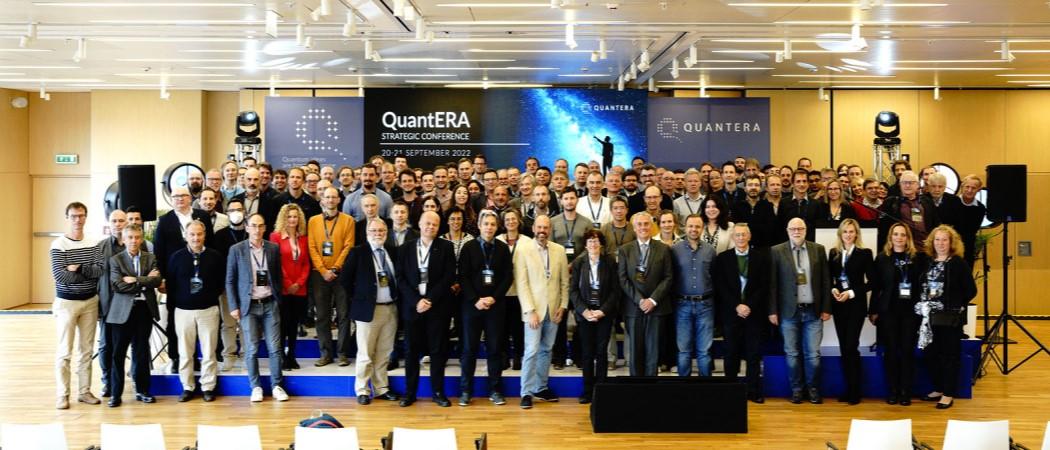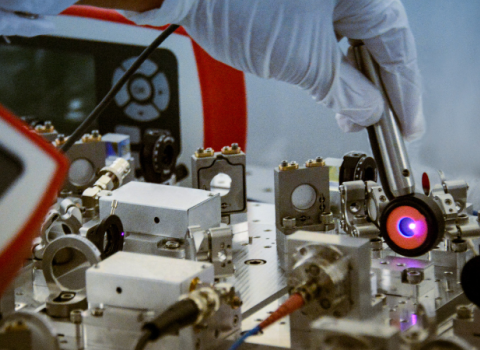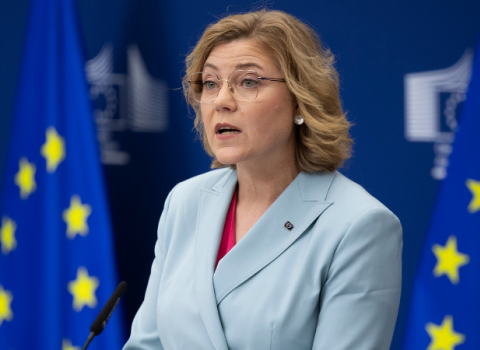The QuantERA research funding programme brings together the scientific community, funding agencies, and industry representatives to leverage transnational cooperation.

QuantERA conference participants, Poland. Photo: QuantERA
The QuantERA programme is designed to accelerate the development of quantum technologies (QT) in Europe, amid global competition. A member of the QuantERA Strategic Advisory Board – a scientific body with a broad range of perspectives in the QT field - has just been awarded the Nobel Prize in Physics. Prof. Alain Aspect, along with Prof. John. F. Cluster and Prof. Anton Zelilinger received the prize “for experiments with entangled photons, establishing the violation of Bell inequalities and pioneering quantum information science”.
Launched in 2016, the QuantERA research funding programme brings together the scientific community, funding agencies, and industry representatives to leverage transnational cooperation. QuantERA promotes collaborative research in QT, supported by 39 research funding organisations in 31 countries. Projects funded by QuantERA, so far, range from fundamental to applied, engaging 400 enthusiastic teams.
When QuantERA was founded, there were only “conceptual ideas”, which today have grown into product prototypes, Sir Peter Knight, chairman of QuantERA Strategic Advisory Board, told Science|Business on the sidelines of QuantERA’s Strategic Conference hosted in Kraków in September. “What we need to focus on is raising money in substantial quantities, and [then] doing it on the big scale,” said Knight. For him, European researchers have an entrepreneurial spirit, and are eager to commercialise their projects.
At the QuantERA conference, researchers from all over Europe presented their latest results and further plans in the fields of quantum computation, simulation, communication, information, quantum metrology sensing and imaging."It is always extremely exciting to immerse in a dynamic scientific community, gathering to passionately discuss results of their research, and engage with other stakeholders in a dialogue on science policy" Justyna Woźniakowska said, from NCN Poland.
QuantERA: a vehicle for sustainable funding
In total, QuantERA has funded 77 projects in three calls in 2017, 2019, and 2021 worth approximately €89 million. “Within QuantERA we have been able to put together many agencies from almost all the countries in Europe, which is extremely important to contribute, reinforce and also to build a great quantum community working on all the subjects related to quantum science and technologies,” noted Elisabeth Giacobino, QuantERA, ANR, France.
“It is important for QuantERA to continue to sustain solid structures for transnational research funding in QT, established throughout the years of the network’s operation,” added Sylwia Kostka, QuantERA Coordinator. “Along with the European Commission and Quantum Flagship, QuantERA strongly contributes to reinforce the quantum ecosystem in Europe.”
QuantERA scientific coordinator Konrad Banaszek explained that the QuantERA programme works bottom-up, which means that the wording of calls is broad and leaves academics freedom to choose research directions. “QuantERA’s objective is to incubate the most promising ideas and concepts so that they can be supported at later stages of their development by other downstream funding instruments,” he said. QuantERA believes regular bottom-up calls allow leaders to build research teams, hire post-docs and PhD students with reasonable success.
Tapping talent from across the EU
One of QuantERA’s priorities is to strengthen collaboration in QT in Europe thus strengthening Europe’s competitiveness. The programme encourages the participation of the countries in which the level of research and innovation is below the EU average. Research teams from so-called “widening countries” have been involved in 78% of the projects funded.
Armando Nolasco Pinto from the University of Aveiro, who coordinates the QuantaGENOMICS project, said the programme has helped to connect scientists from Portugal to their counterparts from other European countries. He coordinates the QuantaGENOMICS project developed in a consortium with researchers from Portugal, France, and Spain, to address privacy concerns in genomic medicine.
However, the involvement of widening countries is not enough: the quantum research area needs to be broadened in numerous directions to efficiently build QT businesses. Pinto stressed that quantum development requires the competence of people from various fields, such as physics, electrical engineers, and computer scientists. “If we want to compete with other countries, like the U.S. and China, that invest a lot of money in quantum technologies, we really need to bring all these people together to push hard,” he said.
Europe makes major public investment
Countries around the world are investing billions of dollars in quantum-related initiatives as the emerging technology has demonstrated its potential to transform society and business. Consultancy McKinsey expects pharmaceuticals, chemicals, automotive, and finance industries to become the first beneficiaries of quantum advantages, with the potential to capture nearly $700 billion in value by 2035.
The apparent potential of QT has accelerated the global competition for leadership in the field. The EU ranks highly in public investment and has adopted ambitious plans, such as the European Commission’s Quantum Flagship programme, founded in 2018 that aims to nudge QT to market.
Transnational collaboration has boosted both quantum research and commercialisation: the EU leads in the number of quantum-relevant publications, according to McKinsey, and is home to more and more start-ups in the field.
From lab to market
The EU now accounts for 25% of total QT companies, and the sheer number of start-ups means competition for funding is strong. As a result, EU researchers often relocate to the US to pursue their career paths.
However, innovation centres in Europe have recently started offering full-scale support to bring start-up projects to success. Christopher Trummer, managing director at Venture Lab Quantum in Munich, said that the early-stage investor landscape has improved in Europe in recent years, and it has become easier to get initial funding. “We have a lot of examples of start-ups that turned into strong companies by now, showcasing that you don't have to go to the US anymore to be successful,” he said.
In fact, Europe is now taking a leading role in quantum key distribution and quantum simulation, Tommaso Calarco, chairman of Quantum Flagship Community Network, told Science|Business on the sidelines of the QuantERA Strategic Conference.
Calarco, who is also a member of the QuantERA Strategic Advisory Board, said growing cooperation between academic groups and industrial research has created a shift in the mindset of the European scientific community, stimulating interest in the entrepreneurial possibilities. He added that Europe has been gradually building up trust in quantum technology by delivering on its promises.
“Google said that they will do the quantum supremacy experiment, and they did. In Europe, we said we will develop practical quantum advantage from programmable quantum simulators, and we did,” Calarco added.





 A unique international forum for public research organisations and companies to connect their external engagement with strategic interests around their R&D system.
A unique international forum for public research organisations and companies to connect their external engagement with strategic interests around their R&D system.